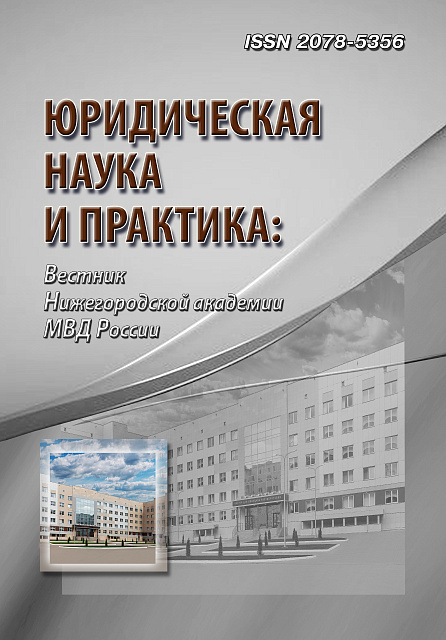National research Lobachevsky State university of Nizhny Novgorod (department of forensic expertise, associate professor)
Russian Federation
The article continues to develop the author’s ideas about the mechanism of proof in criminal cases. This time, private mechanisms of proof are under the research scope. Here hypotheses about their existence are put forward and confirmed, as well as about the place of private mechanisms in the general mechanism of proof. The author presents a large–scale classification on 13 grounds, where the system-forming factor in distinguishing the mechanisms of proof is the category of crimes, clearly demonstrates the relationship between two mechanisms — criminal activity and evidence activities in the form of a three-level “mirror” display: mechanisms, characteristics and techniques. It is established that the classification of private mechanisms of proof will allow us to advance in the construction of a “conceptual bridge” between these mechanisms, clarify their essence and identify flaws for further improvement.
criminal activity, proving activity, mechanism of proof, mechanism of criminal activity, private mechanisms of proof, methods of investigation of crimes, criminalistic characteristics of criminal activity, criminalistic methods of proving crimes, criminal procedural characteristics of criminal activity
1. Ozhegov S. I. Explanatory dictionary of the Russian language: Ok. 100 000 words, terms and phraseological expressions / ed. by prof. L. I. Skvortsova. 26th ed., rev. and add. Moscow: Oniks Publ., Mir i Obrazovanie Publ., 2010. 1360 p. (In Russ.)
2. Bogdanov A. A. Tectology: (general organizational science): in 2 books. Moscow, 1989. Book 1. 304 p. (In Russ.)
3. Shenk R., Hunter L. Know the mechanisms of thinking. Reality and forecasts of artificial intelligence. Moscow, 1987. Pp. 15-26. (In Russ.)
4. Afanasiev A. Yu. Ascent to the mechanism of criminal procedural proof. Bulletin of the Ufa Law Institute of the Ministry of Internal Affairs of Russia, 2019, no. 4 (86), pp. 72-81. (In Russ.)
5. Anokhin P. K. Fundamental questions of the general theory of functional systems / USSR Academy of Sciences. Department of Physiology. Moscow, 1971. 61 p. (In Russ.)
6. Pobedkin A. V. The principle of freedom of assessment of evidence and its impact on the legality of pre-trial proceedings. Proceedings of the Academy of Management of the Ministry of Internal Affairs of Russia, 2017, no. 1 (41), pp. 104-108. (In Russ.)
7. Lubin A. F. Methodology of forensic research of the mechanism of criminal activity. Dissertation… doctor of legal sciences. Nizhny Novgorod, 1997. 337 p. (In Russ.)
8. Criminalistics / ed. by prof. V. A. Obraztsova. Moscow: Jurist Publ., 1997. 760 p. (In Russ.)
9. Kaminsky M. K. Forensic characteristics of activities to identify, disclose and investigate. Legal and socio-economic sciences and the fight against theft of socialist property. Gorky, 1977. Issue 8. Part 1. Pp. 153-158. (In Russ.)
10. Tsvetkov Yu. A. Management in investigative bodies. Course of lectures / ed. by A. I. Bastrykin. Moscow: UNITI-DANA Publ., 2016. 335 p. (In Russ.)
11. Afanasiev A. Yu., Lubin A. F., Lubin S. A. The dua-lism of the mechanism of proof in criminal proceedings. Legal Science and Practice: Bulletin of the Nizhny Novgorod Academy of the Ministry of Internal Affairs of Russia, 2020, no. 2 (50). URL: https://cyberleninka.ru/article/n/dualizm-mehanizma-dokazyvaniya-v-ugolovnom-protsesse (accessed 22.05.2023). (In Russ.)
12. Criminalistics: a course of lectures / ed. by prof. A. F. Lubin. Nizhny Novgorod: Nizhny Novgorod Academy of the Ministry of Internal Affairs of Russia Publ., 2018. 586 p. (In Russ.)
13. Borovskikh R. N. Theoretical foundations and applied aspects of the investigation of crimes in the field of insurance. Dissertation… doctor of legal sciences. Moscow, 2018. 726 p. (In Russ.)
14. Koldin V. Ya. Forensic technique: features or strategy of investigation? Bulletin of Moscow University.Episode 11. Law, 2014, no. 4, pp. 43-49. (In Russ.)












